Archives of Event of the Week
Literary Event of the Week: A Reading for Refugees
Guess how many refugees from Iraq and Syria the United States has accepted this year. Just pick a number that sounds right to you.
Did your number have four digits? Three? If so, you expect waaaaayyy too much of this country. The correct answer, according to the organizers of this reading, is 29 Iraqi refugees and 11 Syrian refugees. That's embarrassing. Jordan, by contrast — a nation of 9.5 million people — has taken in some 700,000 refugees from those countries.
The truth is that America sucks at welcoming people in need. Tonight, a new dessert shop on Capitol Hill is hosting a fundraiser reading for the Collateral Repair Project, which "provides holistic assistance to vulnerable refugees living in Amman, Jordan" using "basic-needs and trauma-relief support" to help them through traumatic times.
The readers at this event include Judy Oldfield, Matt Muth, Richard Chiem, Jakeva Phillips, Katie Lee Ellison, and Kamilla Kafiyeva. All will be reading work on displacement and war and heartbreak and the act of being a refugee. Intrigue Chocolate, which is hosting the reading, will donate a portion of the evening's proceeds to benefit the Collateral Repair Project, in order to help a nation that is actually doing its part to be a good global citizen. Unlike the United States of America, which ought to be ashamed of itself.
Intrigue Chocolate, 1520 15th Ave, 945-3277, https://www.intriguechocolate.com, 7 pm, free.
Literary Event of the Week: Conflicts of interest abound
I try to provide alternate options in the readings calendar when there's a reading that features a conflict of interest. But this Wednesday, even my alternative to the conflict of interest is a conflict of interest. But I promise you that one of these two events will almost certainly be your favorite event of the week.
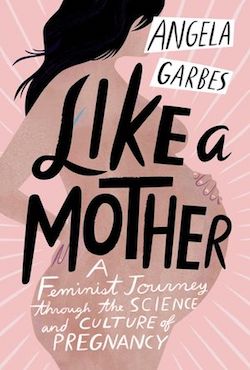
Let's talk about the first conflict of interest: Angela Garbes, who was my coworker at the Elliott Bay Book Company many years ago and was my coworker at The Stranger not so many years ago, launches her new book in a reading at the Summit. Garbes is reading from her book Like a Mother, which is about "A Feminist Journey Through the Science and Culture of Pregnancy." The book has received a ton of positive pre-publication attention, including a very fancy visit to Fresh Air, so you'll probably want to go to this.
And in case it wasn't conflict-of-interest-y enough for you, Garbes is joined in conversation onstage by her old friend (and also my old coworker) Lindy West. Expect a very smart conversation about why some of the most obvious facts about pregnancy and motherhood have been ignored by medical professionals since, basically, forever.
But then across town, there's an event that's even more conflict-of-interest-y than the Like a Mother event. How can that be? Well, I'm part of it.
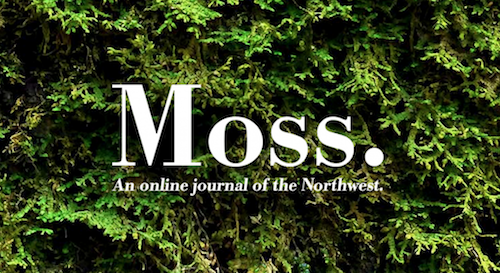
To celebrate the release of its third print edition, Northwest literary magazine Moss is hosting a big party. It takes place in Columbia City at Type Set, the writer-centric coworking space. Food and drink are included in the entry price (which is, uh, free) and you'll hear a ton of new work from Northwest authors.
Richard Chiem, Kristen Milares Young, and Tara Roberts will read fiction and/or prose, and then Jasleena Grewal, Troy Osaki, and Rich Smith will read poetry. I'll be interviewing the poets onstage, in part to help celebrate Moss's foray into the world of poetry, which kicks off with this collected volume. (The magazine originally only featured fiction and non-fiction; they only started running poetry last year.)
Look, I can't tell you what to do on Wednesday night. They both look like great readings. But you probably already know what you want to do — and you should definitely listen to your inner voice. Sometimes the best conflict of interest is the one that's been inside you all along.
The Summit, 420 E. Pike St., 652-4255, http://townhallseattle.org, 7:30 pm, $5, 21+. and Type Set, 3827C, S Edmunds St, https://www.typesetseattle.com/, 7 p.m., free
Literary Event of the Week: Planet Funny reading at Elliott Bay Book Company
Although he first made his name as one of Seattle’s two best-known Jeopardy! champions, Ken Jennings has built an interesting post-game-show career. He’s parlayed a record as the winningest Jeopardy! contestant into literary celebrity.
In addition to a line of trivia books for kids, Jennings is the author of a funny memoir about his time as a Jeopardy! champ, Brainiac. Jennings’s charming Maphead: Charting the Wide, Weird World of Geography Wonks proved that he wasn’t just a one-hit wonder — that there is, in fact, life after Trebek.
It’s hard to talk about Jennings in a literary context without mentioning that he is very, very good at Twitter. Jennings is, in fact, a hilarious writer who perfected the idea of a zinger that could comfortably fit inside a 140- (and then 280-) character limit. You can’t help but picture him in another life writing zingers for the nightly monologue of someone like Johnny Carson.
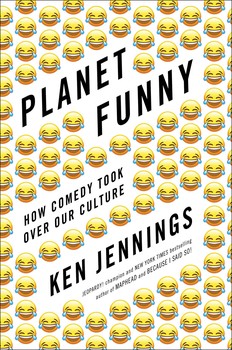
With his newest book, Jennings is combining his literary career with his Twitter skills. Subtitled How Comedy Took Over Our Culture, Planet Funny is a history of comedy — going all the way back to Sumeria — and a reckoning for a time in which every asshole with a Twitter handle thinks they’re the host of their own goddamned Daily Show.
Jennings has been talking about the book that would become Planet Funny for years now — it’s been so long since I first heard about it at a party that I thought maybe he’d given up on the thing — but the delay came for the best reason imaginable: he’s been deep in research. Planet Funny is a deeply considered study of where comedy began, and where it’s going.
Tonight, Jennings celebrates Planet Funny’s release with a reading before a hometown crowd at Elliott Bay Book Company. These are the kind of parties that make literary life in Seattle so much fun. Go be a part of it.
Literary Event of the Week: Cascadia Mag's Almost Summer Reading
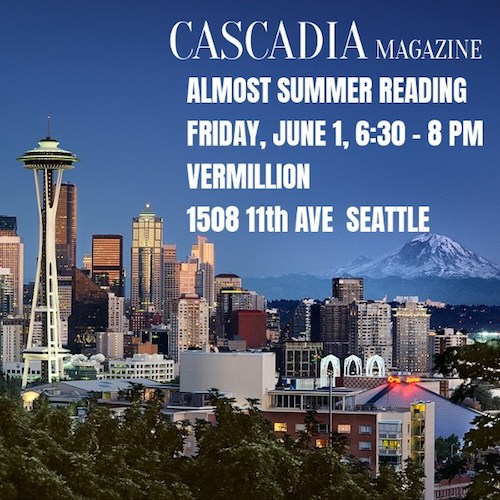
Even though there are seemingly fewer magazines and media outlets in Seattle right now than at any point in recent memory, it is surprisingly difficult to get a publication off the ground. It takes a lot of hard work to remind people to come to a website on a regular basis — hey, thanks, reader! — and Facebook won't allow publishers to find a new audience unless they pay a disgusting amount of extortion money.
That's why I admire Cascadia Magazine for launching a publication at a time when other media outlets are dashing themselves against the rocky shore of public indifference. Bolstered by a daily news email and featuring a voracious mixture of fiction and non-fiction, Cascadia has worked hard to establish a place for itself in the landscape.
Cascadia is a fine balance of a publication: it's smart but not snarky, engaging but not needy, and opinionated without being smug. Billed as "exploring ideas and cultures from the bioregion," Cascadia features author interviews, true explorations of homelessness and equitable pot farming, fiction from writers like Donna Miscolta, and poetry from writers like EJ Koh. In case you can't tell from that list, they are not screwing around at Cascadia.
On Friday, the magazine hosts its first meatspace get-together, in the form of a reading program at Vermillion, the art bar on Capitol Hill that is as close as Seattle gets to a literary hangout. Here's Cascadia's description of the readers:
You’ll hear Donna Miscolta and Anca Szilágyi read new fiction, listen to poetry from Michael Schmeltzer and Montreux Rotholtz, view photographs by Daniel Hawkins, and hear journalists Niki Stojnic and Matt Stangel talk about issues that matter to people living in the Cascadia bioregion.
All that for the low, low cost of free? Why wouldn't you show up for this? At the very least, it's important to show your support for an organization that's happily dumb enough to try to make it in the current media scene. If you find Cascadia publisher Andrew Engelson at the event, buy him a beer and toast his impeccable taste in windmill-tilting. We need more people like him.
Literary Event of the Week: Seattle Reads Homegoing
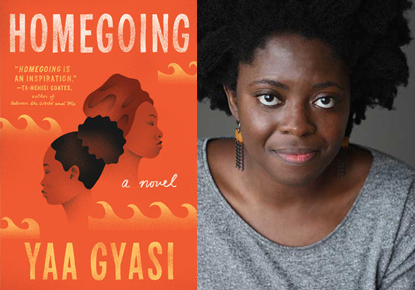
This is the 20th year of the Seattle Reads program, which was originally (and, in my opinion, more successfully) known as "If All Seattle Read the Same Book." You know the idea by now: the Seattle Public Library chooses a book and delivers many dozens of copies to branches around the city. Then, in May, they bring the author to town to read in multiple locations and formats over the course of about a week.
This year's Seattle Reads choice is Homegoing, the debut novel by Yaa Gyasi. (You can see a calendar of Gyasi's appearances on SPL's website.) Homegoing tracks the lives of two sisters born in the 18th century. One is captured and sold into slavery, the other marries into a privileged family. Gyasi follows the sisters and their descendants through history with the confidence one normally associates with someone who has published a long line of novels. It is not a DFW-style doorstop, but it somehow spans 250 years from cover to cover.
Gyasi is arriving in Seattle at a high point in her career - when Ta-Nehisi Coates refers to you as "an inspiration," you know you're doing something right - but it's easy to imagine that she'll ascend to even higher peaks in years to come. The Seattle Reads program is a great way for our city to stake a claim on Gyasi's future success, to ensure that she'll return to share her victories with us for years to come.
(Various locations and times, free.)
Literary Event of the Week: Side Life reading at University Book Store
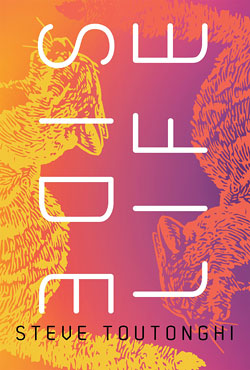
"The story has a note of urgency, but it is also set in a very familiar context," Author Steve Toutonghi told me last year about his then-upcoming novel Side Life. He was unveiling the cover of the book, and we had a great conversation about all the work that modern book covers have to do - they have to be attractive and unique in a display, on a shelf, and as postage-stamp sized images on websites.
"I'm sort of at the edge of my seat to see what this [cover] will look like in the context of a table at a store," Toutonghi said at the time. This week, he finally gets to see: Side Life is finally in bookstores everywhere tomorrow. And this Thursday, Toutonghi debuts the book in a reading at University Book Store.
Side Life certainly lives up to Toutonghi's brief description from last year: It's familiar to any Seattleite. The book takes place in and around Seattle - our freeways, our hills - and the characters in it live on the fringes of our tech-drunk culture. Vin is a wannabe tech star who has been booted from his own company. Dejected, he winds up a housesitter at a Queen Anne mansion.
And the story is urgent from the very beginning. The house in Side Life is haunted, but not by ghosts. Instead, it's haunted by technology: smooth coffins that look like a consumer tech product, notebooks full of computer code, and creeping sense that reality might not be real.
Side Life has been a long time in the making, but it couldn't feel any more relevant. In a time when seemingly everyone is welcoming always-on speakers into their homes and Seattle teeters on the edge of some ugly revelations about the state of the tech economy, this book plays up those anxieties and centers them in one very familiar, very urgent story.
University Book Store, 4326 University Way N.E., 634-3400, http://www2.bookstore.washington.edu/, 7 pm, free.
Literary Event of the Week: Free Comic Book Day in Seattle
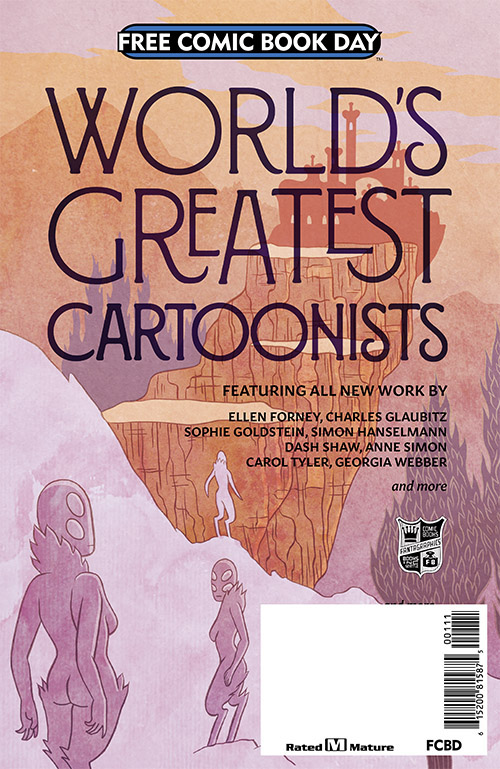
There are a lot of really fine events happening this week, but there's no question what the Literary Event of the Week is: This Saturday is Free Comic Book Day, the day when just about every comic shop in the region offers up free comics to anyone who walks in.
This year's FCBD is a bittersweet one: it's Seattle's very first Free Comic Book Day without long-running downtown store Zanadu Comics, which recently closed its doors. Zanadu fell prey to some very Seattle problems - rising rent - and some of the same problem that comics shops around the country are suffering from.
Comics aren't a niche medium anymore, but the industry still behaves like it's an embarrassing hobby: there's only one nationwide comics distributor, and the two big publishers aren't drawing in audience the way they used to. It remains to be seen if Marvel Comics can recover from a recent sales slump - funny how those movie audiences aren't walking into comics shops, isn't it? - and it remains to be seen if the growing graphic novel sections in independent bookshops will carve away too much business from comics-only shops.
But enough doom and gloom! Seattle still has a remarkable array of comics shops, and many of them are hosting special events for FCBD. Outsider Comics & Geek Boutique in Fremont is hosting a ton of local cartoonists all day long, including Colleen Frakes and Tatiana Gill. Arcane Comics in Shoreline is hosting cartoonists Lisa Pelayre and Marty Gordon, along with a bunch of fun all-ages activities from Parenting Geekly and a huge sale. The Fantagraphics Bookstore in Georgetown is hosting Seattle cartooning goddess Ellen Forney, who'll be signing her new book Rock Steady.
For more information about the closest store to you, visit https://freecomicbookday.com/. And while you should definitely pick up some free comics, if you're not currently strapped for cash or if you regularly attend comics shops, you should buy a book or two while you're visiting to subsidize all the books the shops are giving away to new customers. Comics have probably given you a lot of joy in your life; it only makes sense to pay some of that forward.
Literary Event of the Week: Independent Bookstore Day
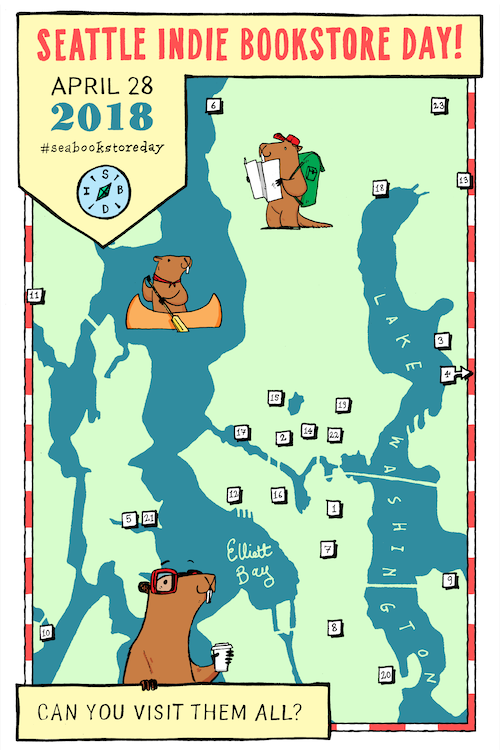
This Saturday, you should prepare yourself for the best independent bookstore celebration day of the year (at least until next Saturday's Free Comic Book Day and this November's Small Business Saturday.) Yes, it's Independent Bookstore Day, in which area bookstores offer up bargains, freebies, and special events to anyone who visits. (Earlier this month, I talked with the owners of two small local indie bookstores, Burien's Page 2 Books and Bothell's Neverending Bookshop, about their plans for the day.)
Independent Bookstore Day is intended to start a national conversation about the importance of independent bookselling, and it's pretty hardcore: hundreds of Seattle-area folks will be racing around the region in an effort to visit all 19 participating bookstores and get their special passports stamped. Everyone who succeeds in this mission will earn 25 percent off all purchases at every one of the bookstores for the next year. If you don't want to devote a whole day to driving around the region, you can get stamps from three bookstores and earn a one-time 30 percent off at any participating bookstore.
There will be a bunch of special items available on Saturday, including a broadside with art representing all the participating stores and a literary map of Seattle. Additionally, audiobook retailer Libro.fm-a wonderful site that partners with independent bookstores-will be offering several free audio books and samplers for download.
You're on this site, so you probably don't need me to lecture you about why bookstores are among humanity's greatest inventions. But you might need me to remind you that, even in the midst of a fairly dreary spring, it's important to show up for Seattle's Independent Bookstore Day, to be counted as a supporter of the amazing resources that our region enjoys. We're all on the same team, here. Now let's show up for each other.
See https://www.facebook.com/SEABookstoreDay/ for more information.
Literary Event of the Week: Sloane Crosley at Elliott Bay Book Company
Sloane Crosley's ascent from book publicist to popular literary humorist is well-documented, though it's not exactly unbelievable - if you want to write books, why wouldn't you get a career working with books? But still, her stint as a book publicist is a part of the mythology of Crosley. Can you believe it?, people seem to be asking when they recount Crosley's biography, she went from writing…shudder….press releases to writing comedic essays!
For me, the unbelievable part of Crosley's story came after her first book of essays, I Was Told There'd Be Cake, was published. She ascended from basically an unknown to a literary celebrity overnight. It's as though Crosley effortlessly landed, fully formed, in the pantheon of literary humorists alongside David Sedaris and Dorothy Parker. Her talent didn't seem to require any unfurling or practice runs: immediately, she displayed a real skill for humor. The rhythm and cadence of comedy came naturally for Crosley, and she wrote like she was born to make people laugh.
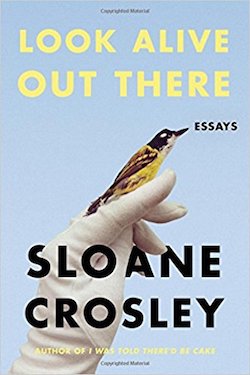
I enjoyed Crosley's first novel, The Clasp, which was a wry and observant study of friendship. But I'm thrilled that her latest book, Look Alive Out There, is a return to the form that made her name - comedic essays. The pieces in this book reflect on the smallest facets of human experience, from the unique challenges of living on top of neighbors in dense urban areas to the expectation of performative do-gooderism when confronted with a moral dilemma in public.
Crosley's gifted at finding the killer line, which perfectly summarizing a situation. Here she is, falling in with friends who are into enneagrams:
One night after work, I go over to their apartment so they can figure out my personality number. This is a fantastically indulgent exercise, like a four-handed massage or group therapy in which only one person's problems are addressed.
Here she is, being sent by a magazine to investigate a chupacabra sighting in Vermont:
I am a less-than-ideal candidate for the job. I don't specialize in mythical-creature hunting or even run-of-the-mill hunting. But the unspoken part of the enterprise is not to find the chupacabra, but to find myself instead, to make a larger point about the power of the imagination, to discover a tick on my shin after traipsing through the woods. Won't that be fun?
This Friday, Crosley debuts Look Alive Out There at Elliott Bay Book Company. She'll be funny and charming and self-deprecating and hearing her read her stories in her own voice will likely make the stories even funnier than they are on paper. You're guaranteed to laugh; she's a natural at this.
Elliott Bay Book Company, 1521 10th Ave, 624-6600, http://elliottbaybook.com, 7 pm, free.
Literary Event of the Week: Parts Per Million reading at Third Place Books Seward Park
Portland author Julia Stoops started writing her debut novel Parts Per Million in 2002, when liberal America was trying in vain to keep President George W. Bush from going to war with Iraq. It's hard to recall now, after Occupy and Black Lives Matter and the Women's March and the March for our Lives, but 2002 made activism feel like a fool's errand. It seemed - to me, anyway, and to many of my friends - that the age of protest had passed, and that the people were powerless in the face of such relentless evil.
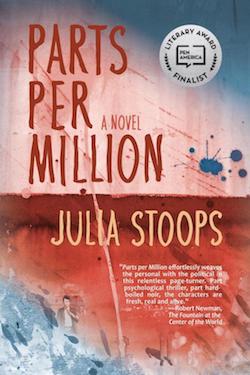
Parts Per Million is a kaleidoscopic novel composed of dozens of short chapters from the perspective of three activists in this time of little hope for activism. They're all compelling characters. Jen is an embittered computer hacker. Irving is a former soldier who dedicates his time to fighting the system he defended. John is optimistic but becoming exhausted that they're not making any progress. They record a radio show, but they're not sure anybody's really listening. They don't know if anything matters.
"The Marysville firebombing was the start," Ian warns us at the beginning of the book, "But what blew up in our faces that year was bigger than that blaze." The three activists find themselves at odds, serving as a kind of microcosm for the way progressives always tear themselves apart.
Parts Per Million is an ambitious first book: it's a thriller and a novel about a friendship in peril and it's a critique of protest culture and it's a love letter to those who are willing to earnestly fight for what they believe, even when it seems that everyone else has given up. (In case you were wondering where Stoops's loyalties lie, the book is dedicated to "environmental activists of every stripe," because "One day you will be considered heroes.") Fans of Edward Abbey's seminal The Monkeywrench Gang will enjoy the way Stoops rethinks and enlivens the concept for a new generation.
This Wednesday, April 11th, Stoops will read and take questions at Third Place Books Seward Park starting at 7 pm in the Seattle debut of her book. If you've ever felt helpless in the face of a giant, uncaring machine, you'll recognize something of yourself in Parts Per Million, and you'll likely find kindred spirits at the reading for the book.
Third Place Books Seward Park, 5041 Wilson Ave S, 474-2200, http://thirdplacebooks.com, 7 pm, free.
Literary Event of the Week: Rebecca Brown, Kreg Hasegawa, and Nico Vassilakis
Rebecca Brown, the smartest writer in Seattle, has been out of commission recovering from a broken ankle. But with spring poking its fuzzy little head out of the newly muddy earth, Brown seems eager to get off the couch and out into the world with at least two events this month. This Thursday at Gallery 1412, Brown will be reading new and old work to celebrate her long winter's hibernation and her new spring awakening.
Brown is helping to celebrate two other writers with local ties. Kreg Hasegawa, one of the tech-savviest employees at the Seattle Public Library, is somehow finding the time during the library's website relaunch to launch a new chapbook into the world. (Hasegawa, of course, is a member of the Margin Shift poetry collective, so he knows his poetry.)
Either of these authors alone would be reason to show up for a reading, but they're joining together to celebrate a very special occasion: the triumphant return of Seattle poet Nico Vassilakis. Vassilakis, one of the world's preeminent visual poetry experts, lived here for years before leaving town for New York City a while back. In the time since, he's been hard at work blurring the line between visual art and poetry - between language and symbols and design.
Vassilakis is visiting town to celebrate the release of his newest book, In The Breast Pocket of a Fine Overcast Day Unlike some of his more outrageous visual poetry work, Pocket is a collection of more conventional poems written between 2010 and 2015. These are poems about love and subways and beauty and death and all the subjects that move poets to write.
Vassilakis was for years a pillar of the poetry community, representing at poetry and comics events all around town, and supporting poets as they started out. This brief return - especially with a book of poems that were in part written here - is a special kind of homecoming.
Gallery 1412, 1412 18th Ave, 7 pm, free.
Literary Event of the Week: Charles Johnson at the Annex Theatre
Charles Johnson is one of Seattle's literary giants - right up there with authors like Jonathan Raban and Richard Hugo and Denise Levertov. One of Seattle's few National Book Award winners and a MacArthur "Genius," Johnson has represented the city at a time when the nation still considered us to be a literary lightweight.
Johnson's fiction has often been celebrated for the way he has corrected the historical record. His historical novels and short stories have helped provide a voice for Black Americans who have been cut out of the history books. He writes exuberantly, with the passion of someone who knows that he doesn't need to ask permission or forgiveness.
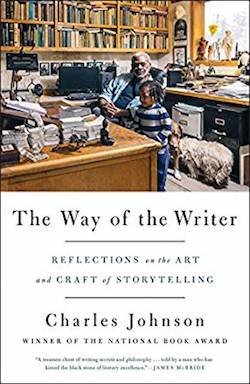
It's no surprise that he excelled as a writing teacher, and that he guided, inspired, and shaped generations of young writers at the University of Washington. Though he's retired from the UW, Johnson confirmed in an interview last year that he's still a teacher. His book The Way of the Writer: Reflections on the Art and Craft of Storytelling offers up some of his most compelling thoughts on the writing craft, but Johnson has a whole world of knowledge inside his head that he's eager to share with new generations of writers.
This Thursday, Hugo House is welcoming Johnson to give a talk about the craft of writing as part of their Word Works series. He'll be delivering a lecture based on his essay "Storytelling and the Alpha Narrative," and then he'll take audience questions on just about any writing-related topics they can imagine. It's an opportunity to listen to one of our most consequential authors, and to drink in a tiny sip of his oceans of expertise.
Annex Theatre. 1100 E Pike St, http://hugohouse.org, 7 pm, $15.
Literary Event of the Week: Literary Murder in Seattle at Third Place Books
We look to novelists to inspire us, but we also look to them to tweak the ugliest parts of our imaginations, to invent the unimaginable, to speak the unsayable. It's not that humans are inherently bad, exactly. We're just inherently fascinated by bad behavior. That's why the Devil - with a little more than a glorified cameo - became the sleeper favorite character of the Bible. We like to think about terrible things, and then we like to put the book down and resume our ordinary lives.
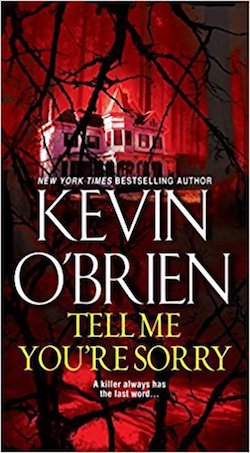
According to Third Place Book's press materials, the two will take part in "a fun and participatory conversation about the best REAL places in and around Seattle to kill someone (fictionally)." Where in town would you be able to kill a person without someone else overhearing? Where would you be able to hide a body? Is there a spot around the Duck Tours route that would be better for murder than any other?
This is a great idea for an event: put two experts together - one Seattle geography expert, one fictional murder expert - and let them riff on the spot where their Venn diagrams mesh. I'd love to see more bizarre literary pairings like this. Why not imagine all the fictional ways you can enjoy Seattle? Why not incorporate sci-fi authors, cookbook authors, historians, and juxtapose them in thrilling ways? I bet people all over Seattle are - forgive me - dying for an event like this.
Third Place Books Lake Forest Park, 17171 Bothell Way NE, 366-3333, http://thirdplacebooks.com, 7 pm, free.
Literary Event of the Week: Dock Street Salon at Phinney Books
Phinney Books had hosted the Dock Street Salon for a couple years, and the reading series filled a very important geographical slot in Seattle's literary scene: there just aren't too many readings for adults in the miles between University Book Store and Third Place Books. The Salon, which is named after Seattle publisher Dock Street Books, is an informal reading and Q&A session with local authors cohosted by Seattle author and publisher Heather Jacobs and the ever-charming and enthusiastic publisher of Dock Street, Dane Bahr.
The Salon disappeared for a little bit there, and I'd worried it had moseyed off into the hall of quietly retired readings series, but I'm happy to report that a new installment - the first of 2018 - arrives this Thursday at Phinney Books.
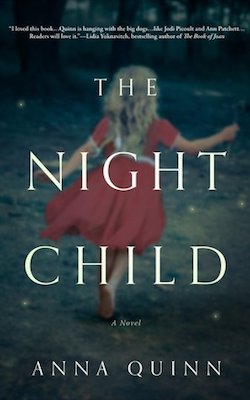
Thursday night, in a reading curated and coordinated by Jacobs, Dock Street Salon is providing a platform for two local first-tine novelists. The first is Port Townsend bookseller Anna Quinn, whose brand-new book The Night Child is about a high school teacher who is terrified by a ghostly vision of a girl's face. The woman desperately seeks a logical explanation, but she might not be prepared for the answer.
Local journalist Jennifer Haupt will publish her first novel, In the Shadow of 10,000 Hills, on (no foolin') April 1st. It's a family saga that stretches from Georgia to the Rwandan genocide. (Haupt covered the genocide's aftermath as a reporter in 2006.)
This kind of event is exactly what Phinney Books does so well in its Salons: it presents local authors in a low-key venue that encourages intimacy and a supportive atmosphere. This is a great opportunity to witness two novelists at the very beginning of their writing careers - and to welcome back one of the best reading series in Seattle.
Phinney Books, 7405 Greenwood Ave. N, 297-2665, http://phinneybooks.com, 7 pm, free.
UPDATE 3/15/2018: An earlier version of this post solely credited Bahr for creating Dock Street Salon. The post has been updated to include Heather Jacobs, who solely put together this week's reading.
Event of the Week: So You Want to Talk About Race at Elliott Bay Book Company
Ijeoma Oluo didn't ask to be Seattle's conscience. But often the most responsible, honest person in any given area is granted a role of community conscience - especially if they'd never asked for that role in the first place.
At times, it seems as though Oluo is biologically incapable of writing a dishonest word. She speaks the truth, clearly and repeatedly. She doesn't suffer fools. She speaks against injustice as often as she needs to, and the world is a very unjust place.
If that hackneyed old quantum theory of infinite universes is true, there's a universe somewhere out there in which Oluo doesn't have to work as a 24-hour truth-teller. In that universe, she films makeup tutorials on YouTube and she writes hilarious reviews and humorous personal essays.
But we live in a universe where everything feels wrong - where systematic racism and sexism has been normalized to the point that demanding equality is enough to mark you in the eyes of the mainstream as a crybaby or a reactionary. And because this is our universe, Ijeoma Oluo wrote her first book, So You Want to Talk About Race. (Oluo reads from the book at Elliott Bay Book Company this Wednesday.)
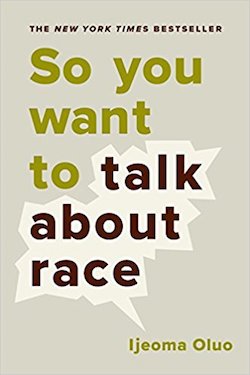
"Race is not something people can choose to ignore anymore," Oluo writes toward the beginning of Race. For too long in this country - and in Seattle - we've ignored race. White people have pretended that the "problem" has been "solved," that we're in a liberal utopia where race doesn't matter. But thanks to the megaphone of social media, we've learned that we haven't "solved" anything - we've just kept entire populations out of the conversation.
Oluo, to her credit, refuses to be dour, or lament her thankless role as someone who starts the uncomfortable conversations about race in the media. "I am so glad you are here," she tells the reader at the end of the first chapter of Race. "I am so glad that you are willing to talk about race. I'm honored to be a part of this conversation with you." It's a statement of genuine warmth, a generous welcome.
Race is a step-by-step guide to discussing race in America. It defines every term, and it starts on the ground floor. There's plenty of good, practical advice: if your conversation about race starts to go wrong, for example, and "If you are white," Oluo says, "watch how many times you say 'I' and 'me.'"
The book is conversational and Oluo is a disarming host. Rather than open her conversation of privilege with a host of bad examples, for instance, Oluo dissects all the privilege in her life that has led to her publishing her first book. The word that comes to mind, again, is "generous."
By the time Oluo has moved into the most controversial topics of our time - police brutality, cultural appropriation, so-called "callout culture" - she has disarmed all but the most hateful readers. Race is exactly what she promised the book to be - a conversation, one that draws in a reader and engages their ideas with a thorough and loving series of questions.
Elliott Bay Book Company, 1521 10th Ave, 624-6600, http://elliottbaybook.com, 7 pm, free.
Literary Event of the Week: Tyehimba Jess at McCaw Hall
Last year, when his collection Olio won the Pulitzer Prize, Tyehimba Jess became one of the best-known living poets in America. Jess has been celebrated in poetry circles for years, of course - leadbelly, a previous collection, won awards in 2004 - but Olio, published by Seattle publisher Wave Books, became an instantaneous must-have collection. Ironically, the fact that Wave was overwhelmed by the demand for Olio might have helped the book's success: it made Olio a must-have book, an object of desire that lasted much longer than the Pulitzer's glow might have lasted.
Jess is an artist who seems custom built for this moment in history. His poetry reflects the rich history of music of Black America - the blues, the gospel, the work songs, the jazz - and he's rewriting the nation's history to make more space for Black stories and songs.
It's often complicated when a Black writer achieves success in white circles. Ta-Nehisi Coates famously rejected calls to assuage white guilt, or to provide cute answers, or to become the next James Baldwin. And Jess's poems - which examine the idea of minstrelsy, and other ways in which Black songs can become harmful entertainment for white America - have been wrestling with this success from the very beginning.
This Sunday, Seattle Arts and Lectures is bringing Jess to McCaw Hall. Almost a full year after his Pulitzer win, it seems very likely that Jess will have something new to say about success, and about the fickle spotlight of fame in 2018 America. The only thing we know for sure is that Jess won't say exactly what white audiences will want him to say. Instead, he'll say what they need to hear.
*McCaw Hall, 321 Mercer St, http://lectures.org, 7:30 pm, $20.
Literary Event of the Week: "Meditation for Writers" at Washington Hall
British Columbia author Ruth Ozeki's majestic 2013 novel A Tale for the Time Being imagined a global perspective on the Northwest, pinning together the Fukushima meltdown with our coastline on the other side of the world. She is a vocal supporter of the amazing Hedgebrook writers residency for women. And she's a natural teacher who has guided new generations to the pleasures and challenges of writing fiction.
Ozeki is also a Zen Buddhist priest-ordained in 2010-and that informs her work more than any single region or theme ever could. Zen Buddhism enables Ozeki to span the divide of time in her work in novel ways, exploding a moment out into an eternity and back again.
This Friday at Washington Hall, Ozeki will speak on the theme "Meditation for Writers," and it is a talk that only she could give. She'll help writers gain the focus that modern technology seeks to steal from them, and the perspective that only a true sense of timelessness can offer.
Here's a video of Ozeki talking on the topic of meditation:
So, look. Maybe you're thinking this is religious bunk, or just feel-good hooey. If so, that's okay. This isn't for you. But if you can't get through a paragraph without checking Twitter lately, I'd advise you to attend this talk. As anyone who's had a burst of inspiration in a shower can tell you, sometimes the very best thing you can focus on in pursuit of fiction is nothing at all.
Washington Hall, 153 14th Ave, http://washingtonhall.org, 8 pm, $15.
Literary Event of the Week: Bushwick Book Club at Langston Hughes Performing Arts Center
At this point, you likely know the deal with the Seattle branch of the Bushwick Book Club, right? They’ve been around for years, so odds are good you’ve encountered at least a listing for one of their events. If you’re new here, or if you haven’t been paying attention, here’s the deal: local musicians create all-new music in response to a book. The results obviously vary, depending on the book and the musicians who are participating. That’s how anthologies work!

But this week, we’re about to bear witness to the closest thing the Bushwick Book Club has ever seen to a Sure Thing — a guaranteed fantastic time. This Friday, February 16th, at the Langston Hughes Performing Arts Institute, the Bushwick Book Club will create new music based around Seattle sci-fi giant Octavia Butler’s Parable of the Sower.
Butler, of course, is one of the greats — the first sci-fi writer ever to win a MacArthur “Genius” Grant, and arguably the sci-fi writer who did the most in the 20th century to legitimize the genre as an art form. Sower predated the dystopian fiction craze by a half-century, and its story—about a young woman who is gifted (or cursed) with a supernatural empathy—pretty much instantly became a science fiction classic.
The Book Club called in KEXP’s DJ Riz (Riz Rollins) as a guest curator, and he’s selected an all-star lineup of Seattle talent to participate: Om Johari, JR Rhodes, Coreena Brown, Reggie Garrett, Tiffany Wilson, Adra Boo, Okanomodé, Nikkitta Oliver, Monique Franklin and Yonnas Getahun.
So we’ve got a world-class writer, one of Seattle’s very best DJs as curator, and a revitalized arts organization to host. Could this be the very best Bushwick Book Club ever? All signs point to yes.
Langston Hughes Performing Arts Institute, 104 17th Ave S, 7:30 pm, $10.
Literary Event of the Week: Baby Boomer at the Factory
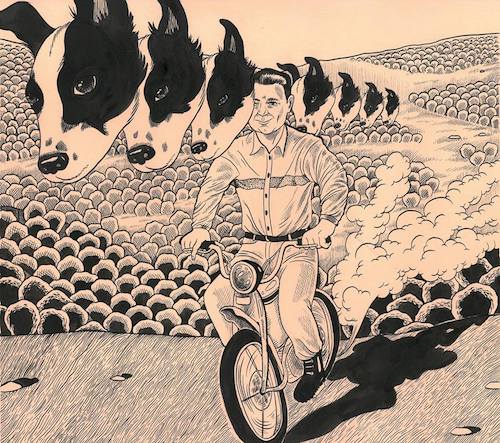
Marie Hausauer is one of Seattle’s mightiest cartoonists. Check out any of her strips and you’ll immediately recognize her confident lines and bold color choices. She can be funny or serious or flip back and forth between the two in a single eight-panel strip.
And Hausauer is transcending the gag strip in exciting ways. Her 2016 comic Raccoon focused on the dead and rotting body of a raccoon in the Northwest wilderness with a literary sensibility that evokes minimalists like Raymond Carver. At the time, I remarked that “Raccoon’s realism falls comfortably within the continuum of Northwest fiction. It feels like a story that could only spring from our part of the world.”
Hausauer also works in the field of visual art — by which I just mean she sometimes draws without words or panels. Last year, she brought a show called SLIDESHOW to art space The Factory. In it, she illustrated a family’s photo slides from the 1960s. On Thursday, February 8th, she returns with Baby Boomer, a new set of illustrated found slides featuring dirt bikes, families, and weird gender politics.
Make no mistake: Baby Boomer is a comic. It tells a story about the past, which also reflects on our present. The way Hausauer imagines the elements of these photographs comments on the past and remixes it for our uncertain present. One can imagine all these works collected in a book that documents the American Century as the American Century documented itself. I’d read the hell out of that book.
The Factory, 1216 10th Ave, 6 pm, free.
Literary Event of the Week: Passing the Torch at the Seattle Public Library
Here we are at the end of January and 2018 is already shaping up to be a long year. Everything under the sun is either a disaster or a distraction from a disaster. We’re learning the horrible truth behind the legends that the media has printed for decades, and we’re realizing that nobody has any goddamn clue what’s going on.
It’s important, in the middle of all this chaos and drudgery and nightmare news notifications, to celebrate. Find a thing that you love, something that you’re proud of, and shout about it to anyone who’ll listen. Gather with friends and make a big scene. Enjoy what you have and make it matter.
This Wednesday, the last day of January, at 7 pm in the downtown branch of the Seattle Public Library, outgoing Washington State Poet Laureate Tod Marshall will celebrate the end of his triumphant two-year tenure. Marshall has been a great force for poetry in this state, advocating tirelessly for Washington poets, even publishing an anthology of local poets titled WA 129.
Tonight, Marshall passes the torch — it’s a metaphorical torch, don’t get too excited — to the state’s incoming Poet Laureate, Claudia Castro Luna. Luna was until recently Seattle’s Civic Poet, which is basically a poet laureate role for the city. Castro Luna and Marshall will be joined by Seattle’s current Civic Poet, Anastacia-Renee, making this evening a veritable who’s who of government-sponsored poetry. (Somewhere, Paul Ryan is undoubtedly clawing at his own eyes and shrieking into the night at the thought of government cash going to poets at all. Fuck that guy.)
Other Washington poets will be onhand, too, to read their own work and to celebrate Marshall’s tenure and to welcome Castro Luna to the new job. Readers include Duane Niatum, Georgia McDade, Phillip Red Eagle, Quenton Baker, Rachel Kessler, Dawn Pichon Barron, Bill Carty, and Shankar Narayan. Look: it’s dark and wet and cold outside. Why not go where it’s warm and people are smart and appreciative and kind? You know, for a change?
Seattle Public Library, 1000 4th Ave., 386-4636, http://spl.org, 7 pm, free.